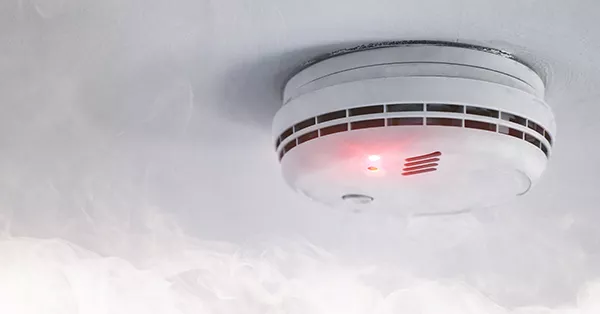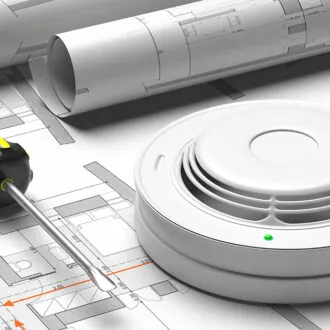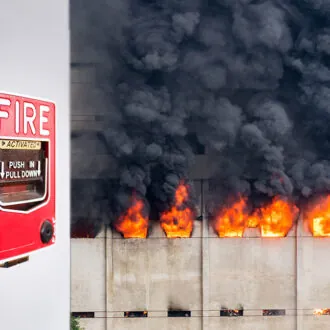Commercial Fire Alarm Systems
Wireless smoke detectors are a cost effective option for commercial fire alarm system installation in some cases. Like wired smoke detection systems, wireless smoke detectors are code compliant when they meet NFPA standards. The NFPA 72 sets out certain requirements for wireless smoke detector manufacturing, installation and testing which must be met in order to be code compliant. In this article, we will go over some of the specific requirements for wireless smoke detectors and weigh pros and cons of wired versus wireless smoke detectors.
Code Requirements for Wireless Smoke Alarms
The NFPA requires wireless smoke detector and fire alarm systems to meet all requirements for wired alarm systems, plus specific factors affecting the wireless technology involved in wireless fire alarm systems. Here are some of the requirements:
- Fire alarm system products must be UL listed or listed by another comparable agency.
- Wireless smoke alarm systems must be battery operated. The batteries must be capable of powering normal device operation for one year and have an audible low battery signal.
- A signal between smoke alarms must be transmitted at least every 200 seconds.
- The system must have a fault mode to audibly notify building occupants if the battery or alarm system fails.
- Failure of the battery in one unit cannot disable the functioning of the remaining units.
- The wireless smoke alarm system must receive regular fire alarm inspection and maintenance.
Wireless Smoke Alarm Pros and Cons
Wireless Smoke Detector Pros:
Wireless smoke alarm systems can be less expensive to install than wired alarm systems, especially in buildings that require extensive cosmetic work to conceal fire alarm system wiring.
In these situations, you will also have a lower cost for fire watch during installation, which is required when no active fire alarm system is present.
Wireless Smoke Detector Cons:
In a wireless smoke alarm system, the signal is not relayed as quickly as in wired systems, which have an average minimum delay of 5-10 seconds. If a signal is transmitted every 5-10 seconds between wireless smoke alarm units, this significantly impacts battery life. Wireless systems could have a signal delay of up to 2 minutes to extend battery life. In 2019, the National Institute of Standards and Technology conducted a fire simulation study on wireless smoke alarms and found that the delay of up to 2 minutes fortunately did not significantly impact the ability of occupants to exit a building in case of a fire.
At Palmer Electric, we generally recommend wired smoke alarm systems for reliability. However, we do offer wireless smoke alarms for commercial fire alarm installations in certain situations.
Wireless Smoke Alarm FAQ’s
What are wireless smoke alarms?
Wireless smoke alarms are smoke alarms connected by wireless technology in a building. When one smoke alarm is triggered, a signal is transferred to all other smoke alarms in the building, notifying occupants throughout the building. A “wired” smoke alarm system works in the same way, but the signal is transmitted electronically through wires that connect the smoke alarms, rather than wirelessly.
What is the difference between smoke alarms and smoke detectors?
A smoke detector is different than a smoke alarm in that it only detects smoke; a smoke detector does not contain an audible or visual alarm mechanism. In colloquial use, we often use “smoke detector” and “smoke alarm” interchangeably, but in technical language, a smoke detector serves one purpose (detecting smoke) while a smoke alarm both detects smoke and alerts occupants.
What are wireless smoke detectors?
Wireless smoke detectors are wirelessly connected to a compatible fire alarm control panel (FACP). When a smoke detector is activated due to the presence of smoke, it transmits a signal to an FACP, which activates the audible notification devices. Notification devices produce a loud, audible and visual alarm throughout the building to notify occupants to exit the building. The NAC booster panel must be connected to the notification devices with wires, so a wireless smoke detection system does utilize some wiring, and is not completely wire free.
What is a smoke alarm?
Smoke alarms contain both a detection mechanism to detect smoke in a building and an audible or audible/visible alarm mechanism to alert occupants. Smoke alarms are also called “single station alarms” or “multiple station alarms.” Smoke alarms can be wirelessly connected to alert occupants in unison or operate individually, in which case every individual smoke alarm must be triggered by smoke in order to go off and sound a loud, audible / visual notification.
Fire Alarm System Testing, Inspection and Maintenance
Palmer Electric is a leading provider of commercial fire alarm system installation, testing, inspection and maintenance for the Orlando and Central Florida area. We provide both wired and wireless smoke alarm systems. Contact us for a free estimate to find out which fire alarm system is right for your company at (407) 646-8700 x 793





